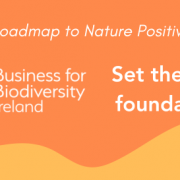What’s the Business Outlook for Nature in 2025?
2024 was an eventful year for those of us working in advancing nature action at both national and global level.
The much-contested EU Nature Restoration Law was brought in – and the Green Party, which was in Government at the time, with Ireland’s first Minister for Nature Malcolm Noonan, were instrumental in getting it over the line. However, there remains political pushback at home and abroad as we enter 2025 and environmental concerns slip further down the agenda in the face of the cost-of-living crisis, political turmoil and global conflict.
Extreme weather incidents are putting these concerns squarely back on the agenda for the private sector as we start 2025, particularly in the area of insurance and financial investments. Fears are being raised in the food sector due to the climate and nature crises, and we will likely see tourism, hospitality and retail affected globally, as well as a rise in public health concerns. The latest WEF Global Risks Report rates several environment-related risks in prominent positions in their Top 10 for a 10-year analysis, with the risk from biodiversity loss and ecosystem collapse ranked in second place, after extreme weather events. The short-term (2 years) risk analysis ranks extreme weather events in second place, however, the risk from biodiversity loss and ecosystem collapse is not as prominent yet on the short-term list of worries for polled business leaders. This is surprising given that it is now widely understood that biodiverse ecosystems create resilient landscapes and enhance carbon sequestration, lessening the effects of climate change such as extreme weather events. (The Economics of Biodiversity aka the Dasgupta Review, for the UK Treasury in 2021, warns we must start accounting for nature’s contributions in national accounts to inform decision-making for future resilience).
We welcome the announcement of a new Minister of State for Nature, Heritage & Biodiversity, Christopher O’Sullivan TD, at the Department of Housing, Local Government and Heritage, and hope concrete and swift action on nature loss and degradation will be set in motion once Ireland’s National Restoration Plan, being developed by the National Parks & Wildlife Service in conjunction with relevant stakeholders, is finalised. The new Programme for Government pledges to keep the Infrastructure, Nature & Climate Fund, instigated by the previous government, with plans to pursue more funding at EU level, and delivery of Ireland’s National Biodiversity Action Plan 2023-2030, which sees a whole-of-government, whole-of-society approach. We look forward to continuing to work with a number of government departments in developing and implementing actions to support businesses in achieving this.
Despite an uneven progress following successive global summits on climate and nature, BFBI agrees with recent commentary by Business for Nature’s CEO Eva Zabey that interest levels and discussions on biodiversity within the business and policy world are certainly “maturing and multiplying”. “Tackling complex issues such as biodiversity loss and its interconnections with climate and social equity takes time, where global discussions remain key, even if they don’t always result in the urgent progress we are collectively striving for.
“This requires all of us to act with both urgency and perseverance. We take heart in the progress made over the past 12 months by our fantastic community and partners, and by the growing number of businesses and policymakers committed to building a nature-positive future for all by 2030.”
Zabey lists some key highlights from the past year, including the introduction of the EU’s Corporate Sustainability Reporting Directive (CSRD) in effect for 11,000 companies in 2025.
“Over 500 companies have committed to disclosing their nature-related issues to investors using the TNFD recommendations – a 57% increase since the beginning of the year, 30 companies have published dedicated nature strategies through It’s Now for Nature and first mover companies publicly adopted science-based targets for nature. These are encouraging signals of change.”
However voluntary action by businesses is far from the norm, and many organisations still do not understand their impacts and dependencies on nature. There is confusion among Irish companies on the scope of the new reporting rules, with a number of our larger legal firms seeking clarification from the Government on how the legislation is to be applied in Ireland.
It is essential that the new Government and the business sector show leadership in making this the year to accelerate our transition to Nature Positive rather than risk playing catch-up – if you are new to it all, start here on our free Discovery Track with access to the evolving guidance and resources coming your way in 2025, including our free webinar series.
Those keen to make the commitment to put prior learning and resources into action now can join our Nature Strategy Accelerator Programme’s paid Action Track for tailored help to get your reporting on track, and be ready to make real positive impact for your business and for nature. We’ll help you to advance to our Strategy Track and Evolution Track, through our Roadmap to Nature Positive (in alignment with the global Now for Nature Strategy), to maintain a steady path to long-term sustainability.












